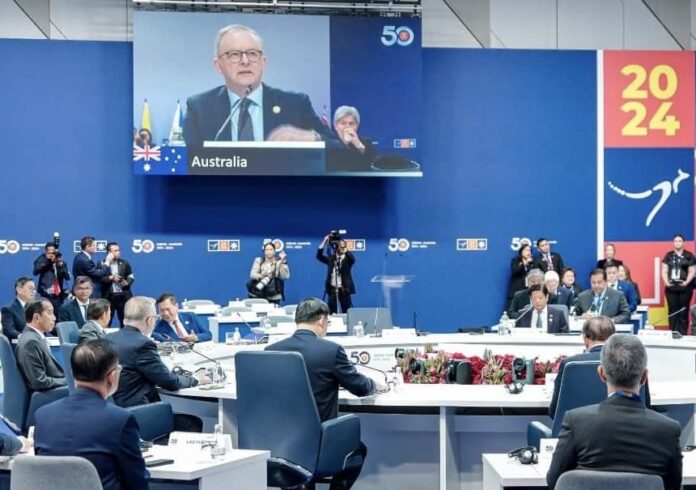
-
President Ferdinand Marcos, Jr. is confident the ASEAN-Australia-New Zealand Free Trade Agreement will benefit small and medium enterprises and improve their access and participation to global value chains
-
On February 14, Trade Secretary Alfredo Pascual signed the Second Protocol to Amend the Agreement Establishing the AANZFTA
-
The new provisions under the Second Protocol respond to evolving challenges in the business environment and aim to maintain the agreement as a relevant, high- quality FTA, according to the Department of Trade and Industry
President Ferdinand Marcos, Jr. is confident the ASEAN-Australia-New Zealand Free Trade Agreement (AANZFTA), the second protocol of which was signed recently by Trade Secretary Alfredo Pascual, will benefit small and medium enterprises (SMEs) and improve their access and participation to global value chains.
In a speech during the leaders’ plenary at the ASEAN-Australia Special Summit in Melbourne on March 6, Marcos said he is confident the AANZFTA will continue to respond to the evolving multidimensional challenges in the business environment and complement region-to-region efforts to strengthen supply chain resilience, the expansion of trade and investment, inclusivity and sustainable development.
“The Protocol will indeed benefit micro, small, and medium enterprises (MSMEs) inasmuch as it facilitates their participation in international trade by improving their access to markets and participation in the global value chains, as well as promoting the use of e-commerce,” said Marcos.
He added that he is confident that with the AANZFTA, together with the Regional Comprehensive Economic Partnership Agreement, “we will usher in even more robust economic cooperation within our region and provide a legal framework for a more prosperous future.”
On February 14, Pascual signed the Second Protocol to Amend the Agreement Establishing the AANZFTA.
READ: DTI signs 2 instruments enhancing FTA with Australia and NZ, HK
The Second Protocol, signed in August 2023, updates the original AANZFTA and the First Protocol signed in February 2009 and August 2014, respectively.
Under the 2nd Protocol, 13 Chapters in the original AANZFTA – including Rules of Origin, Customs Procedures and Trade Facilitation, Investment, Competition and Consumer Protection, and Electronic Commerce – have been upgraded.
Three new chapters, namely Government Procurement, Micro, Small and Medium Enterprises (MSMEs), and Trade and Sustainable Development, as well as new provisions on education services under the Chapter on Trade in Services have also been added. This responds to the needs of businesses to make the AANZFTA more efficient in order to lower costs.
DTI in an earlier statement said the new provisions under the Second Protocol respond to the evolving multidimensional challenges in the business environment and aim to maintain the agreement as a relevant, high-quality FTA.
DTI said the new rules to boost merchandise trade under the Chapter on Trade in Goods and Customs Procedure include facilitating trade of essential goods during humanitarian crises and addressing related issues on non-tariff measures.
Market access commitments under the amended AANZFTA Chapter on Trade in Services are also seen to provide greater stability for Filipino businesses interested in investing and providing services in Australia and New Zealand. These include sectors such as professional services, education, transportation, construction, tourism, and banking services, among others.
Other key provisions under the Second Protocol are the professional services and education services cooperation annexes, which provide a framework for authorities to negotiate initiatives on the mutual recognition of professional qualifications, licensing, or registration in professional services sectors or bilateral or regional cooperation.
These provisions will allow recognition of educational qualifications, digital education, blended learning, and other diverse forms of education delivery. They will further assist Filipino professionals in practicing their profession in Australia and New Zealand.
Moreover, this new commitment complements the country’s implementation of the Transnational Higher Education Act passed in 2019, allowing foreign universities to provide education services through partnering with a local institution.
There are also enhanced provisions to promote electronic payments in the region, competition rules to lower barriers, and consumer protection to ensure fair trade practices.




